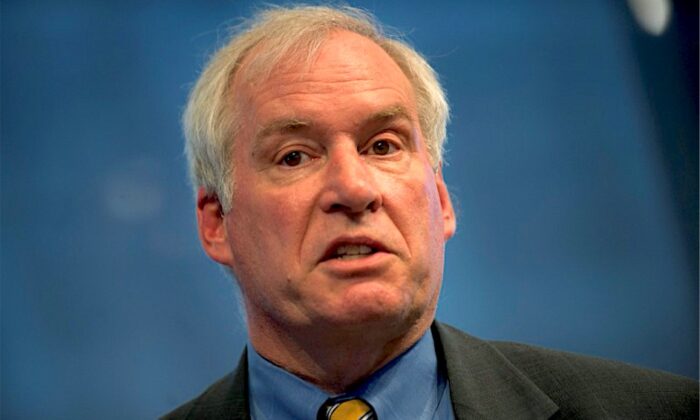Eric Rosengren, president of the Boston Federal Reserve, said Wednesday that insufficient state-level measures to contain COVID-19 not only put lives at risk but are also likely to sap the strength of the economic rebound.
“Limited or inconsistent efforts by states to control the virus based on public health guidance are not only placing citizens at unnecessary risk of severe illness and possible death but are also likely to prolong the economic downturn,” Rosengren said in prepared remarks聽for delivery to the Massachusetts South Shore Chamber of Commerce.
Rosengren tied the path of economic recovery to the course of the CCP (Chinese Communist Party) virus, saying that as long as the potentially deadly bug poses a significant threat to Americans’ health, any rebound will be limited.聽America鈥檚 economy suffered its biggest blow since the Great Depression in the second quarter of this year, with gross domestic product (GDP) falling at its steepest pace in at least 73 years.
“As long as the virus poses significant threats to public health, a full economic recovery will be very difficult as individuals, often voluntarily, avoid activities that place their health at risk,” he said.
Days after the Atlanta Fed’s economic model raised its predictions for annualized growth in the third quarter to 20.5 percent,聽President Donald Trump expressed confidence that the economy would soon stage a robust recovery.
“There is no reason why the economy can’t grow at a 20 percent pace in the third quarter; that would be a record,” Trump told reporters at the White House on Monday. “We’re creating new incentives for work and jobs, and we’re also providing much-needed assistance to those who are still suffering from the effects of the pandemic contraction,” he added.

Policymakers in government and in the Federal Reserve system have taken unprecedented actions to blunt the economic impact of the virus, with Congress authorizing around $3.6 trillion in new spending since March and the Fed dropping rates to near zero and exploding its balance sheet to flood markets with liquidity.
Still, Rosengren argued that while policy actions have helped take the sting out of the COVID-19 bug, they can only go so far.
“Indeed, the trajectory of the economic recovery will be determined more by the path of the virus than by the path of policymaking, although monetary and fiscal policy can mitigate, and have mitigated, some of the most significant adverse impacts,” he said.
He pointed to spending growth data showing that states that moved to re-open early and quickly experienced short-term economic gain but as infections resurged, this was followed by even bigger pain.
“States that re-opened early and quickly lifted restrictions saw a short-term increase in activity, but it was at a cost鈥攔ising rates of infections, which resulted in less spending more recently,” he said. “In short, lifting restrictions too early and too quickly hurt both the economy and public health down the road.”
States in the Northeast, which imposed more stringent and longer-lasting lockdowns, are now experiencing better health outcomes and more vigorous economic recovery, he said. This is similar to the differences in outcomes between Europe and the United States, with European countries imposing tighter restrictions followed by more robust rebounds.
“In contrast, in the United States, infection rates remain elevated, as states lifted protective measures too soon and in a manner not calibrated for the true risks posed by the virus,” Rosengren said.
The Boston Fed chief added that the economic outlook remains uncertain but he expects the recent slowdown that has become apparent in high-frequency economic data to continue.
“Currently, we have an unemployment rate above 10 percent, and because of the continued community spread of the virus, I am concerned that the pandemic will limit the ability of the economy to recover quickly,” he said.
 People drink outdoors at bars and restaurants in the Hells Kitchen neighborhood of New York on June 7, 2020. (Bryan R. Smith/AFP via Getty Images)
People drink outdoors at bars and restaurants in the Hells Kitchen neighborhood of New York on June 7, 2020. (Bryan R. Smith/AFP via Getty Images)The most recent monthly nonfarm payrolls report showed that the U.S. economy added 1.763 million jobs in July, bringing the unemployment rate down to 10.2 percent.聽While a better-than-expected number, July鈥檚 job gains fell far short of June鈥檚 4.8 million increase and May鈥檚 2.7 million gain, and indicates that only around 40 percent of the jobs lost due to pandemic-driven shutdowns have come back.
The most recent jobless claims figures, which are released on a weekly basis each Thursday, painted a similarly mixed picture of economic recovery. Bright spots聽in last week’s data include the fact that the number of newly filed jobless claims dropped by 249,000 in the week ending Aug. 1 from a week earlier, after rising for two straight weeks. Also, the number of continuing jobless claims dropped by 844,000 to 16.1 million for the week ending July 25.
Still, the very same jobless claims report showed that the number of American workers filing initial unemployment claims came in at more than 1 million for the 20th straight week. It also showed that the聽total number of people claiming jobless benefits in all federal and state programs for the week ending July 18 rose by 1.3 million compared to the previous week, bringing the total to more than 32 million, suggesting that despite green shoots in the economy, a cloud of uncertainty persists.
Focus News: Fed’s Rosengren Says Patchy Pandemic Response Threatens Economic Recovery
White House Seeking to Cut Capital Gains Tax via Congress: Kudlow
